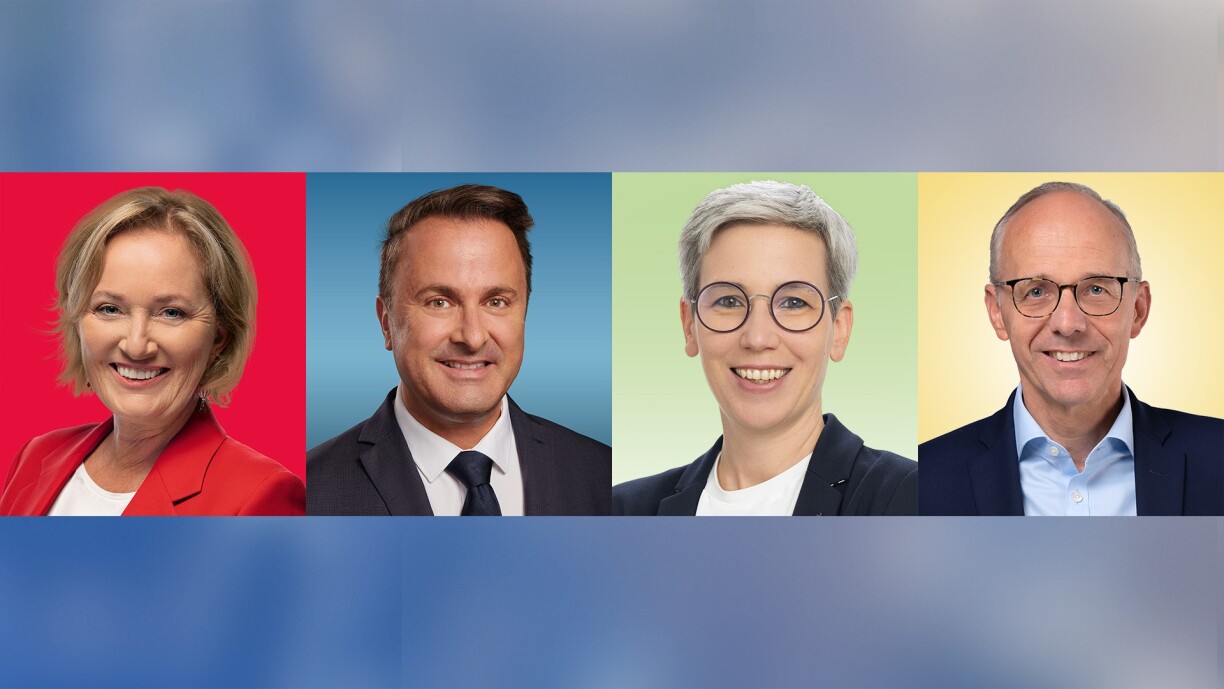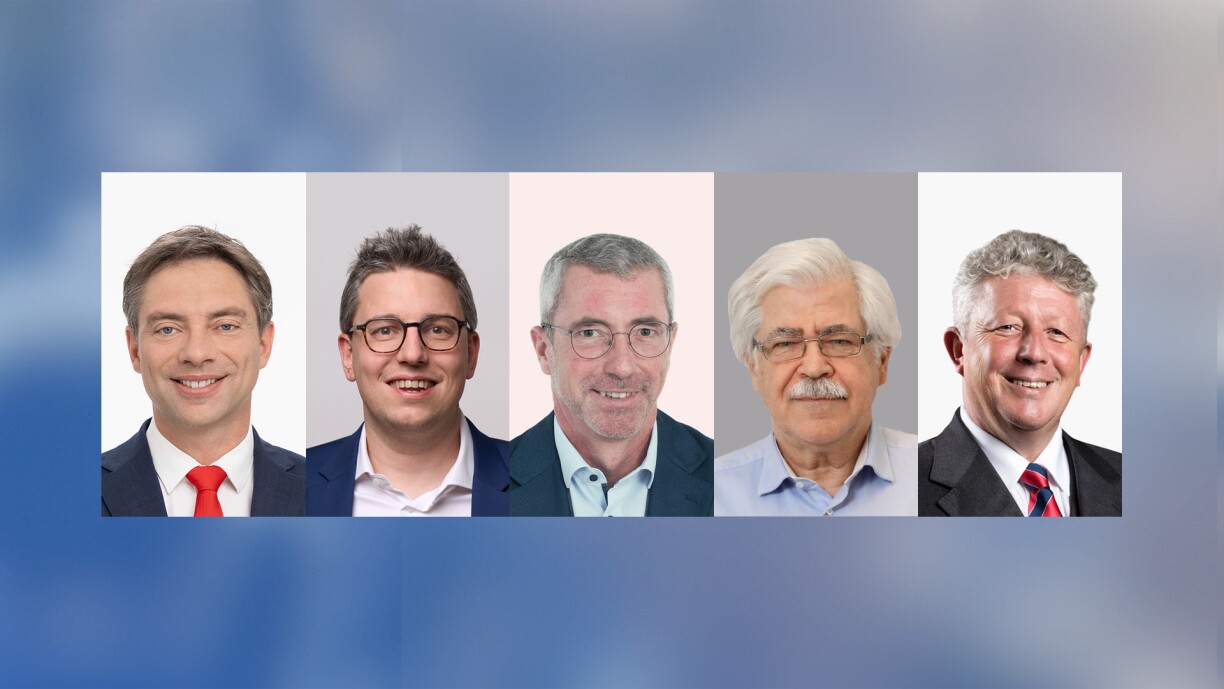
As the first female lead candidate for the LSAP, 55-year-old Paulette Lenert represents socialist renewal and her party’s hope to once again form part of the future government. Yet just five years ago, Lenert was a relative unknown to the general public. Her political rise has been nothing short of meteoric, serving first as vice-president of the administrative court of Luxembourg, first government adviser to the Minister of Solidarity Economy (2010 to 2013), then joining the Ministry of the Civil Service where she ensured general coordination from 2014.
The former lawyer was appointed Minister of Development Cooperation and Humanitarian Affairs and Minister of Consumer Protection following the 2018 elections - in which she did not participate - but her defining role came as she replaced Etienne Schneider as Minister of Health, shortly before the coronavirus pandemic was declared in 2020. Thrust into the spotlight as the world grappled with Covid-19 lockdowns, Lenert gained favour among the electorate and was named Luxembourg’s favourite politician in July 2020. Although she took a short break from her duties due to stress amidst the pandemic, she was named Deputy Prime Minister in January 2022, and in April 2023 announced her ambitions of leading the country as the LSAP’s lead candidate.
RTL interview: “I feel I know exactly where I want to go”
Xavier Bettel, the incumbent Prime Minister, was a clear choice to be the DP’s lead candidate, thanks to his proven record in leading the government over the past decade. From 2013 to 2023, Bettel showed he had the confidence and charisma to lead Luxembourg through a series of successive crises on both a national and European level. At the age of 50, despite a two-decade-old plagiarism scandal regarding his student thesis at the University of Nancy, Bettel continues to enjoy high popularity ratings among the electorate.
A poll in early September cemented his position as Luxembourg’s favourite candidate for the role of Prime Minister among the country’s largest parties. In particular, Bettel’s jovial nature and training as a lawyer remain among his assets, but his long and uninterrupted political experience is perhaps key to his success. President of the DP Youth at 21, Bettel went on to be elected as an MP at 26 and served as mayor of Luxembourg City aged 38 before moving on to lead the nation. But could the challenge prove too great this time round? The PM is well aware that power can wear down voters. However, he is running in a DP stronghold - the central constituency, alongside finance minister Yuriko Backes - and the party delivered successful results in June’s municipal elections, so Bettel’s “home advantage” could once again work in his favour.
RTL interview: “The state itself has been driving up [housing] prices”
Sam Tanson was unanimously chosen as the head of the national list by déi Gréng (the Greens), in a show of confidence. Until now, the Greens operated as a duo; however, Tanson’s former 2018 running-mate and political mentor, François Bausch, announced his intentions to step down as a minister during the next legislation. Although the Greens’ participating within government represented a first for Luxembourg back in 2013, they have fared less well in polls this year, dropping in popularity according to the latest “Sonndesfro” survey.
But at 43, Tanson embodies the second generation of ecologists engaging in Realpolitik, and, as a seasoned politician, is unlikely to panic. With ministerial portfolios including Culture and Justice, Tanson’s political career was predated by a stint as a journalist for RTL, then a career in law. At the age of 28, she served as a spokesperson for the Young Greens (Jonk Gréng), then spent five years in the post of the party’s national president until 2014. In 2013, she gained popularity as first alderman for Luxembourg City, alongside the DP’s Lydie Polfer (DP), and resigned her seat to become Minister of Housing and Culture after re-election as an MP in 2018. She replaced Félix Braz as Minister of Justice following the latter’s illness in 2019.
RTL interview: “I deleted my Facebook 3 years ago”
Since winning unanimous support from the CSV (Christian Social People’s Party) on 1 February, Luc Frieden marked his return to politics after a decade by heading up his party’s lists going into Sunday’s elections. After the CSV’s removal from power in favour of the DP-LSAP-Green coalition in 2013, the party has been on the hunt for a new face to rival the stature of Jean-Claude Juncker, who served as Prime Minister for over 18 years. Could Frieden, one of the most experienced politicians to enter the race, be the right candidate to restore his party to power?
The one-time Minister of Justice, Finance, and Defence put his political career on hold for ten years and declined to stand in the 2018 elections. At 60, the trained lawyer boasts extensive experience in government and economic knowledge gleaned from heading up several institutions, such as Deutsche Bank. Although the CSV has the most seats in parliament, with 21 MPs, it has spent a decade on the opposition benches. Frieden hopes to embody their renewal, and despite his inseparable political ties to the Juncker years, shares the constituency posters with young co-president Elisabeth Margue (33).
RTL interview: “The C in CSV stands for values, not religion”

Fred Keup, 43, was unanimously chosen as the lead candidate by his party, the Alternative Democratic Reform Party (ADR), to mark exactly one year after he was elected president. The former geography teacher has experienced a fast and strong rise through the political ranks, although he was not elected as an MP during the 2018 legislative elections, despite gathering over 8,800 votes. He finally entered the Chamber of Deputies in 2020 after the departure of Gast Gibéryen. Keup began his political career in 2015, the year of the big referendum, where among other things, 78% of Luxembourgers voted against extending the right to vote to foreign residents. A proponent of the “No” campaign, Keup founded the website “Nee2015.lu”. His new movement “Wee2050" enabled him to join the ADR list during the last election in 2018. Today, Keup’s mission is clear: the party aims to get five seats in parliament, which would grant the ADR more influence in the Chamber.
RTL interview: Fred Keup prioritises security over growth
Sven Clement, 34, is the lead candidate for the Pirate Party (Piraten), of which he was also a founding member in 2009. Known for his big smile and passionate engagement, the computer scientist turned head of a digital communications consultancy has made a real leap in popularity since he entered parliament five years ago. Representing the younger cohort of politicians, Clement is just as at ease on social media as he is in the limelight and front of microphones. He advocates for more transparency in the Luxembourgish government and more equality for all, and was behind the “Medicoleak” affair that revealed computer security breaches to medical data on national athletes. In July he was named the 6th most popular politician amongst Luxembourgers. Clement now has the same challenge as Fred Keup - to give his party 5 seats in the Chamber of Deputies, and give them more say over bills submitted to parliament. Recent polls suggest the Pirates, who currently have two MPs, could achieve their goal today, particularly after a successful run in June’s municipal elections.
RTL interview: “We want people to feel they have a voice in politics”
Former CSV president Frank Engel, 48, is the spokesperson and co-founder of Fokus, which he founded in 2022 alongside Marc Ruppert, a former general secretary of the DP, Gary Kneip and Luc Majerus. Fokus has submitted full candidate lists in Luxembourg’s four districts, and calls itself a “pragmatic” party “without a fixed ideology”. Engel, a trained lawyer, hopes to change Luxembourg’s political framework, and also restart his political career. For eight years he served as general secretary for the CSV then, from 2009 to 2019, he represented the party in the European parliament. In 2019 he became the party’s president. However, he stepped down after being accused of misuse of social funds by several CSV members, although he was later acquitted in court. Engel’s aim today is to get at the very least one seat in the Chamber of Deputies.
RTL interview: Housing, growth and democracy on Fokus’ election agenda
Ali Ruckert, who at 69 is one of the oldest lead candidates this year, is the president of the Luxembourgish Communist Party (KPL), which he joined in 1971. Most assertive when it comes to defending purchasing power and workers’ rights, the editor in chief of the Lëtzebuerger Vollek newspaper has been the party’s president since 2000. Until June, he was a member of the municipal council in Differdange but he was not re-elected. Ever since 1984, Ruckert has been trying to return the communist party to their 1970s heyday, in which they held six seats in the Chamber. His party is only standing in the South, Centre and Eastern districts.
RTL interview: “The capitalist system needs to be ‘overcome’”
Roy Reding, 58, is the lead candidate for Luxembourg’s newest party to participate in this election. Founded in July, Liberty-Freedom (Liberté-Fräiheet) has one seat in the Chamber of Deputies. Reding was elected as an ADR member but left the party earlier this year because of a “flagrant breach of trust”. For ten years, he served as the only sitting MP for the ADR, but the party declined to name him as front runner in the centre district in 2023, leading to his departure. Reding then attempted to join Fokus, but was not offered a spot on their lists, which led him to found his own party. It should be noted that Liberté-Fräiheet managed to gather a list in every district in a very short time.
RTL interview: Liberté to contest upcoming national elections
Three parties have declined to name lead candidates at national level, instead opting to focus on regional districts with a number of candidates in the different electoral constituencies.
These are déi Lénk (the Left), currently represented by two MPs in the Chamber; Volt, a young pan-European political movement founded in 2018 in Luxembourg; and the Conservatives (“déi Konservativ d’Fräiheetspartei”), a conservative party with patriotic values, founded in 2017.
The Left party has a list of candidates standing in each constituency. In the south, they are represented on the ballot by Marc Baum, Carole Thoma, Gary Diderich and Line Wies; David Wagner and Ana Correia da Veiga in the centre; Laurent Fisch and Adela Fuentes in the east) and none in the north.
RTL interview: “The government must distinguish between basic needs and luxuries”
Volt has candidates standing on two lists in the south and east of the country.
The Conservatives have two lists, led by Joe Thein and Roy Holzem in the south and Serge Closter and Svenja Defays in the north.